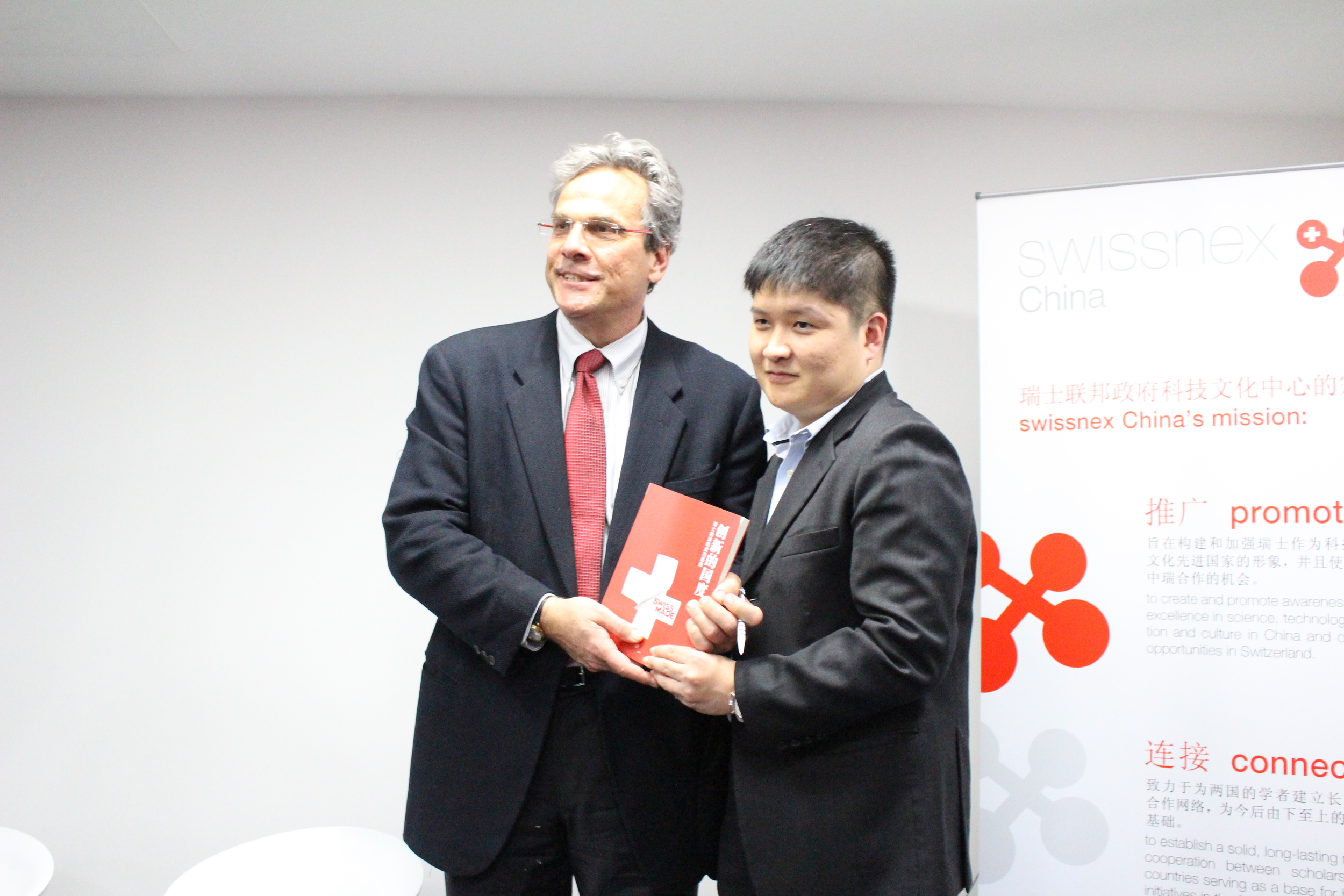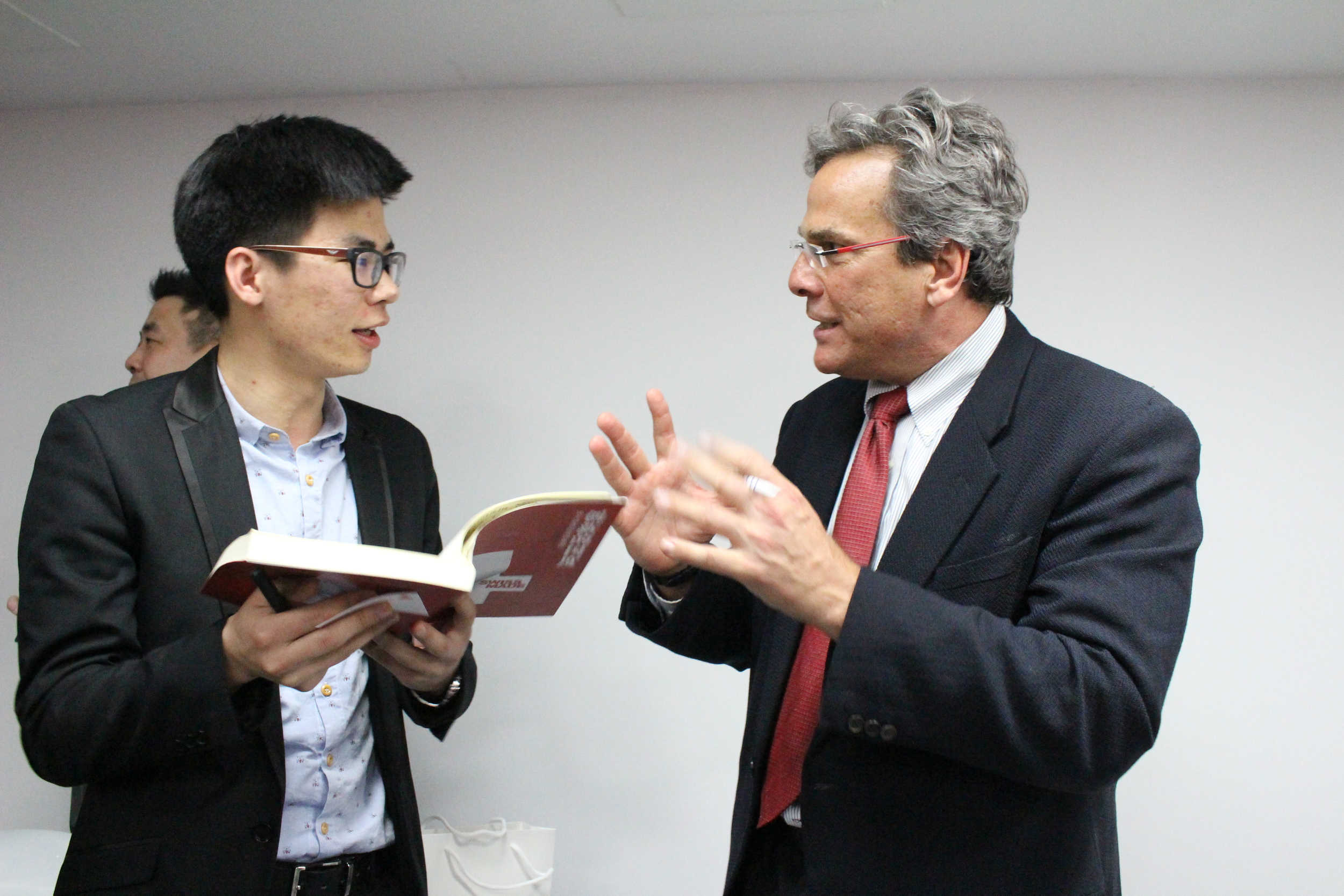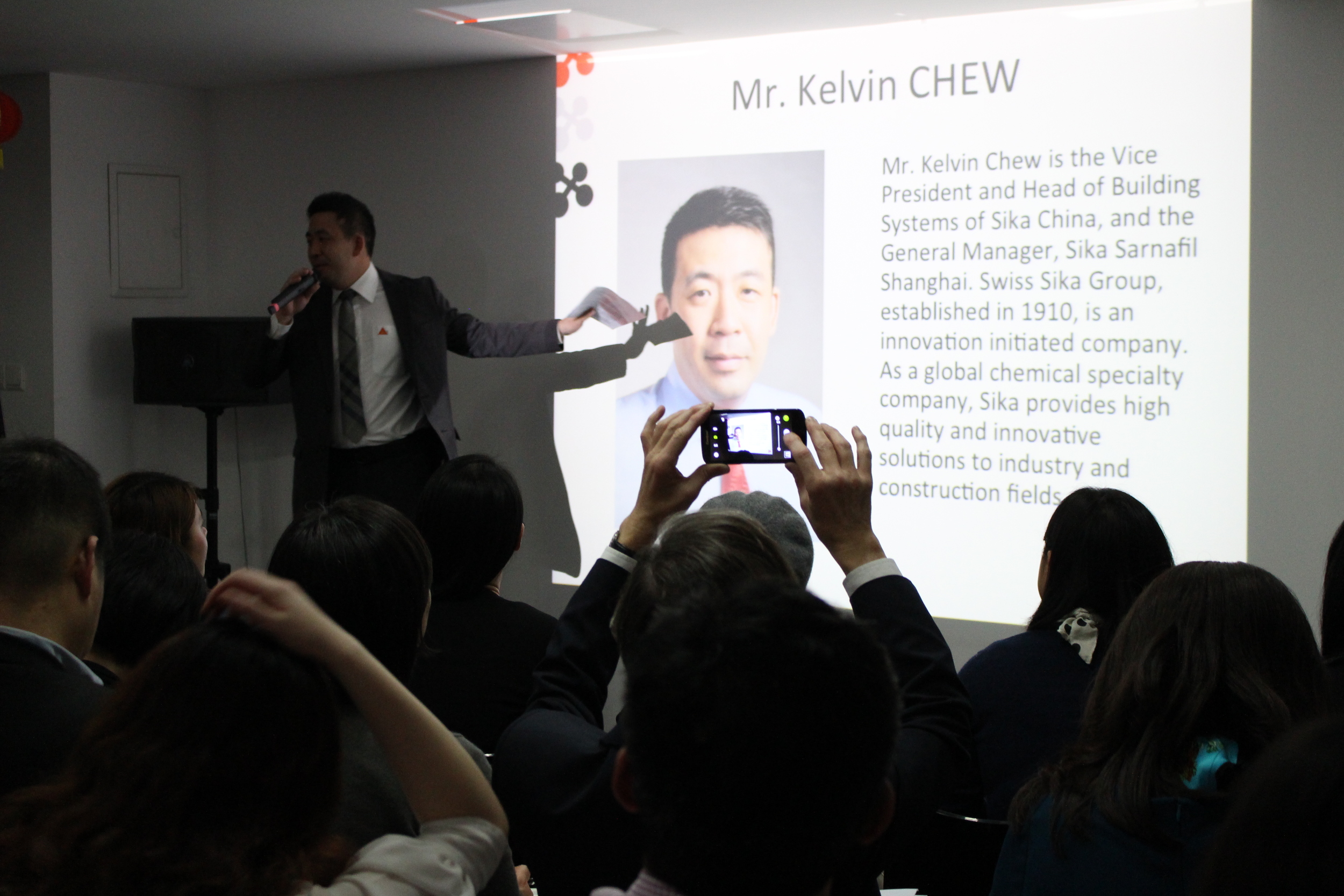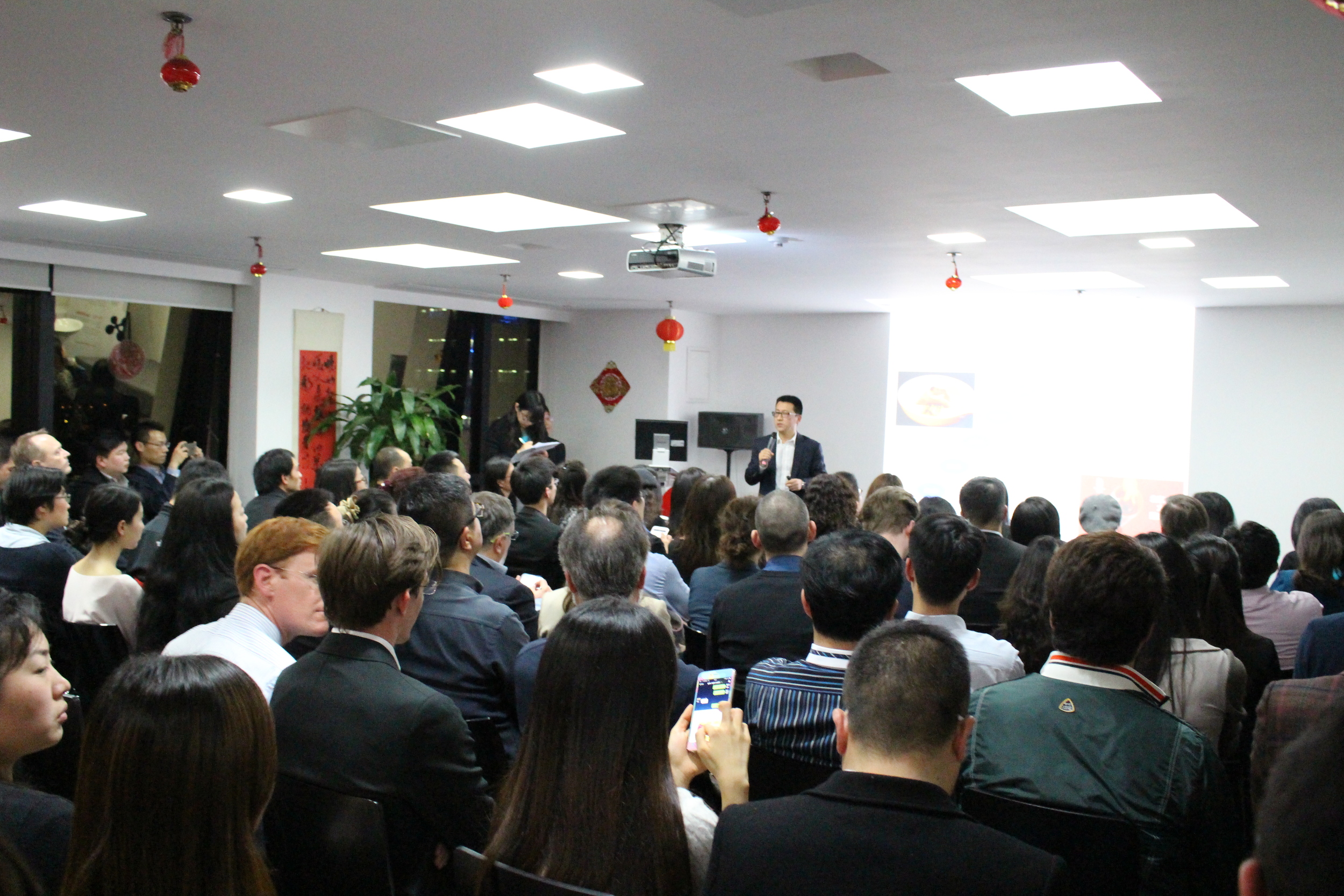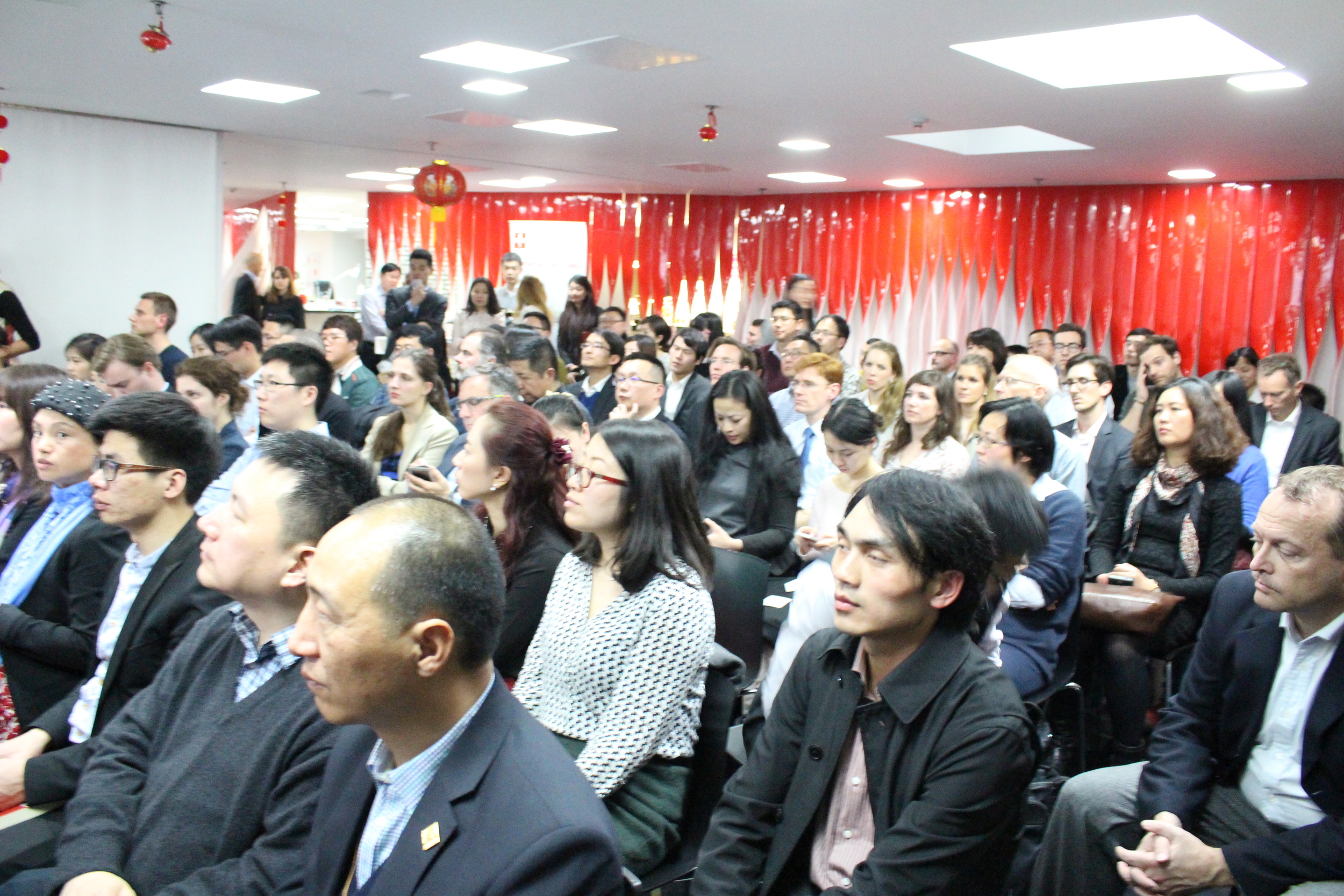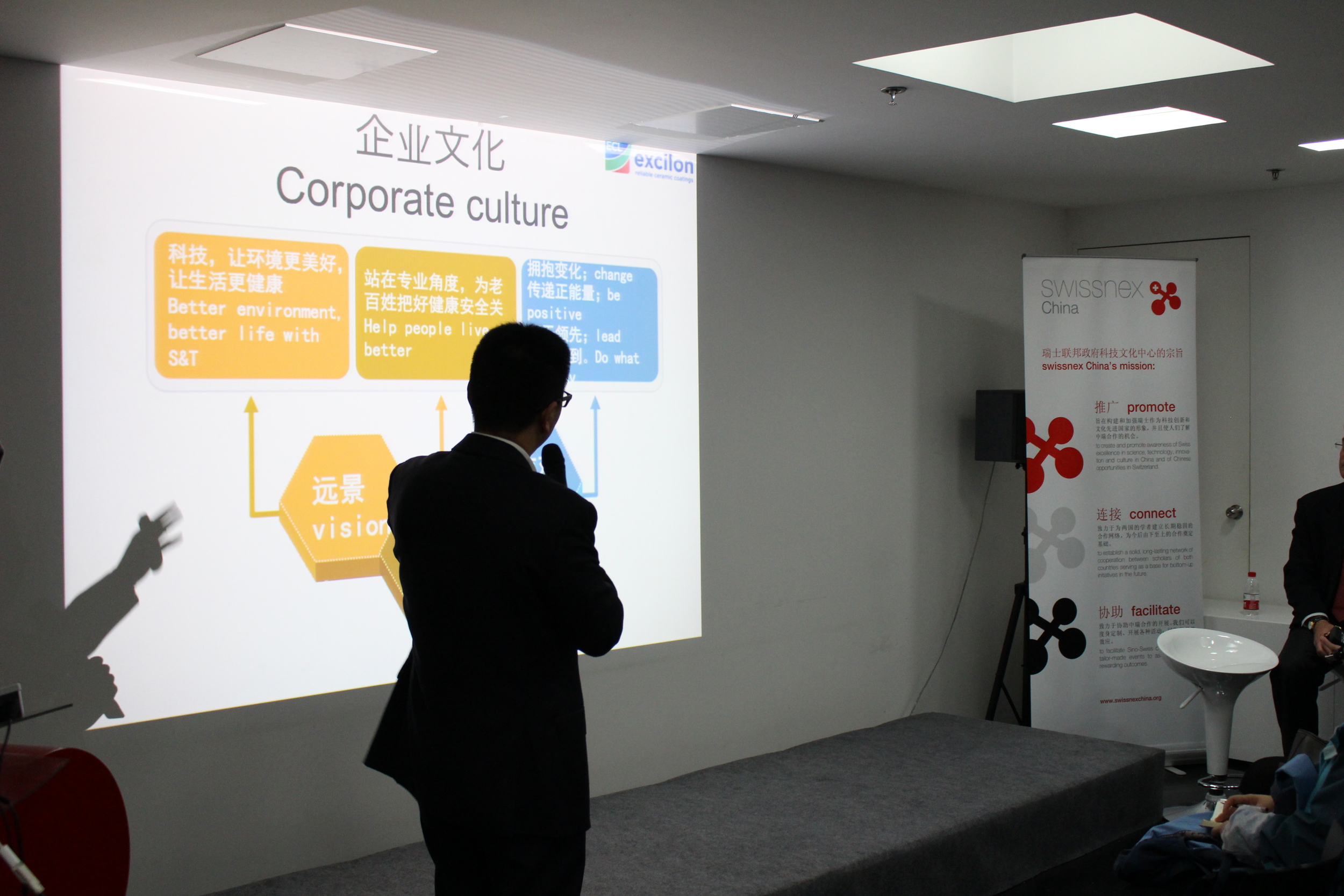The Freitag community met in Shanghai last Friday night to celebrate their favorite brand and to attend a design talk given by Daniel Freitag.
Read MoreSino-Swiss FTA: Technical Barriers and How to reduce them
During this conference, Christophe Perritaz and Juerg Vollenweider from the Swiss State Secretariat of Economic Affairs, gave us insightful speeches about: Free Trade Agreements as a foreign policy’s instrument, the Sino-Swiss FTA and the reduction of technical barriers in trade.
Read MoreE-Payment Power in China
In a country that surpassed the United States in 2008 in term of number of internet users and where online purchase seems to be the new favorite way of shopping, E-payment has obviously a great role to play in China.
Read MoreAn inspiring morning with 22 start-ups
This year the Global Pitchfest, organised by swissnex China and venturelab, took place at breakfast time in Gemma restaurant where you can eat one of the fanciest breakfasts in Shanghai; but even the most mouth-watering breakfast ever could not have taken the spotlight away from the 22 impressive start-ups competing this year.
Read Moreventure leaders China 2015
This year’s edition of venture leaders China stood once again in the spotlight of 10 innovative Swiss entrepreneurs, starting in Beijing with an intensive three-days program involving various business experts, entrepreneurs and investors.
Read MoreCapital Risque, Innovation et Startup en Chine
This conference has been organized by the “Section romande de la Société Suisse-Chine” in collaboration with the “Chambre de commerce Suisse-Chine, Section romande”, with the support of swissnex China.
Read More65th Anniversary at the Embassy in Beijing
The Ambassador of Switzerland to China, Mr. Jean-Jacques de Dardel, invited us on September 14 to celebrate the 65th Anniversary of bilateral relations between Switzerland and the People's Republic of China.
Read MoreYoung Swiss entrepreneurs in China: Let’s meet!
swissnex China organized an entrepreneur meeting on the occasion of the Swiss national day, on Saturday 1st of August.
Read MoreA sneak peek into the China Hardware Innovation Camp in Shenzhen
The China Hardware Innovation Camp (CHIC) is a project initiated by Dr. Marc Laperrouza together with Alex Wayenberg and Pascal Marmier.
Read MoreYoung Swiss Challenge: Entrepreneurship Workshop
On July 2, swissnex China organized a joint workshop with Young Swiss in China. The topic?... Entrepreneurship!
Read MoreA Rendezvous between European SMEs and Chinese leading firms – with the visit of the CBP from Basel
This year, the 3rd edition of the Sino-Euro BioPartnering, held in May, welcomed more than 300 participants.
Read MoreHong Kong, where ambitions rise higher than the tallest skyscrapers
From its traditional Kowloon markets to its luxury alleys of Central, Hong Kong is the theatre of constant development. At the feet of the biggest army of skyscrapers in the world, the streets witness millions of transactions every day, in which Swiss companies have a very big part to play.
Read MoreChina’s Tech Start-up Boom
China has the second largest consumer market in the world. Its population of 1.35 billion, of which more than 50% live in urban areas, will generate an estimated GDP growth of approximately 7% over the next 10 years.
Read MoreWhen “Swiss Made” Meets “Made in China”
While “Swiss Made” is considered the symbol of quality and even luxury, “Made in China” is much more controversial. When “Swiss Made” meets “Made in China”, the spark of innovation is generated. To trigger that spark, swissnex China, together with Swiss Cham, Shanghai Swiss Center and Newhuadu Business School (NBS) invited Mr. James Breiding, author of the book Swiss Made: The Untold Story behind Switzerland’s Success, Mr. Lifeng LI, chairman of Shanghai Excilon New Materials Co.,Ltd and Mr. Kelvin CHEW, Vice President and Head of Building Systems of Sika China, General Manager of Sika Sarnafil Shanghai , to share with the audience their experience and stories of doing business in China.
The event was held at the swissnex China office, and attracted a large audience. The registration system was even forced to close early because people registered for the event quickly outnumbered the seats available at the site.
The event started with a welcome speech by Mr. Pascal Marmier, CEO of swissnex China and Vice Consul General of Switzerland in Shanghai. Then Dr. Lifeng LI shared with the audience his story of starting his own business in China, and how he developed his business into a leading company in the industry. He also shared with the audience his understanding of the “New Normal” in China, and his advice for business to survive and thrive in China under the “New Normal”. Then, Mr. James Breiding introduced the development history of Swiss companies, with fascinating success stories of some of the world’s best-selling brands. After Mr. Breiding’s speech, Mr. Kelvin CHEW generously shared his experience of how to manage a Swiss company in China, how they learnt from their failure, and how to constantly innovate to eventually make Sika China a great success.
Following the speeches is a panel discussion and a Q&A session moderated by Dr. Prof. LIN Hua, Vice Dean of NBS and Executive Dean of NBS Switzerland, which provided a golden opportunity for business starters and interested students to consult and to exchange ideas. And as always, with words from the wise to serve your minds, we still hoped to provide something that can give you a great appetite. Delicacies were prepared and the guests were served with good wine.
The event on March 17th is the first of a series of lectures on “Swiss Made and Swiss Innovation”. A seminar has also been held at Antai College of Economics & Management–Shanghai Jiao Tong University on March 18th, where Mr. Breiding delivered a lecture on the Swiss method of Innovation and how it differs from Silicon Valley. Followed by a Q&A, the class, which included several international students, had the opportunity to question Mr. Breiding on both his work and personal life.
- Contributed by Joy Zhao, Junior Project Leader Academic Affairs
Innovation in China: Fast Times and Faster Companies
On March 4, the swissnex China Beijing office within the Embassy of Switzerland co-organized a panel discussion on Innovation in China with the title Fast Times and Faster Companies, hosted by Swiss Ambassador H.E. Jean-Jacques de Dardel. The exclusive event, which generated a huge interest among the Beijing start-up community – exceeding the seating capacity by six fold – has welcomed distinguished speakers and tech-savvy guests for a lively exchange on the latest developments within China’s start-up and technology scene. The moderated talk by Andy Mok, co-organizer and Managing Director of Red Pagoda Resources, was joined by:
- Julie Makinen, Fast Company contributor & Beijing correspondent for the Los Angeles Times
- Dr. Zhang Yusheng, CEO & founder of Apricot Forest (2nd most innovative company in China)
- Frances Du, Director of Microsoft Ventures in the Greater China Region
- Jason Zhao, Vice President at Kleiner Perkins Caufield & Byers China, and
- Olivier Glauser, Co-founder and CFO of Shankai Sports
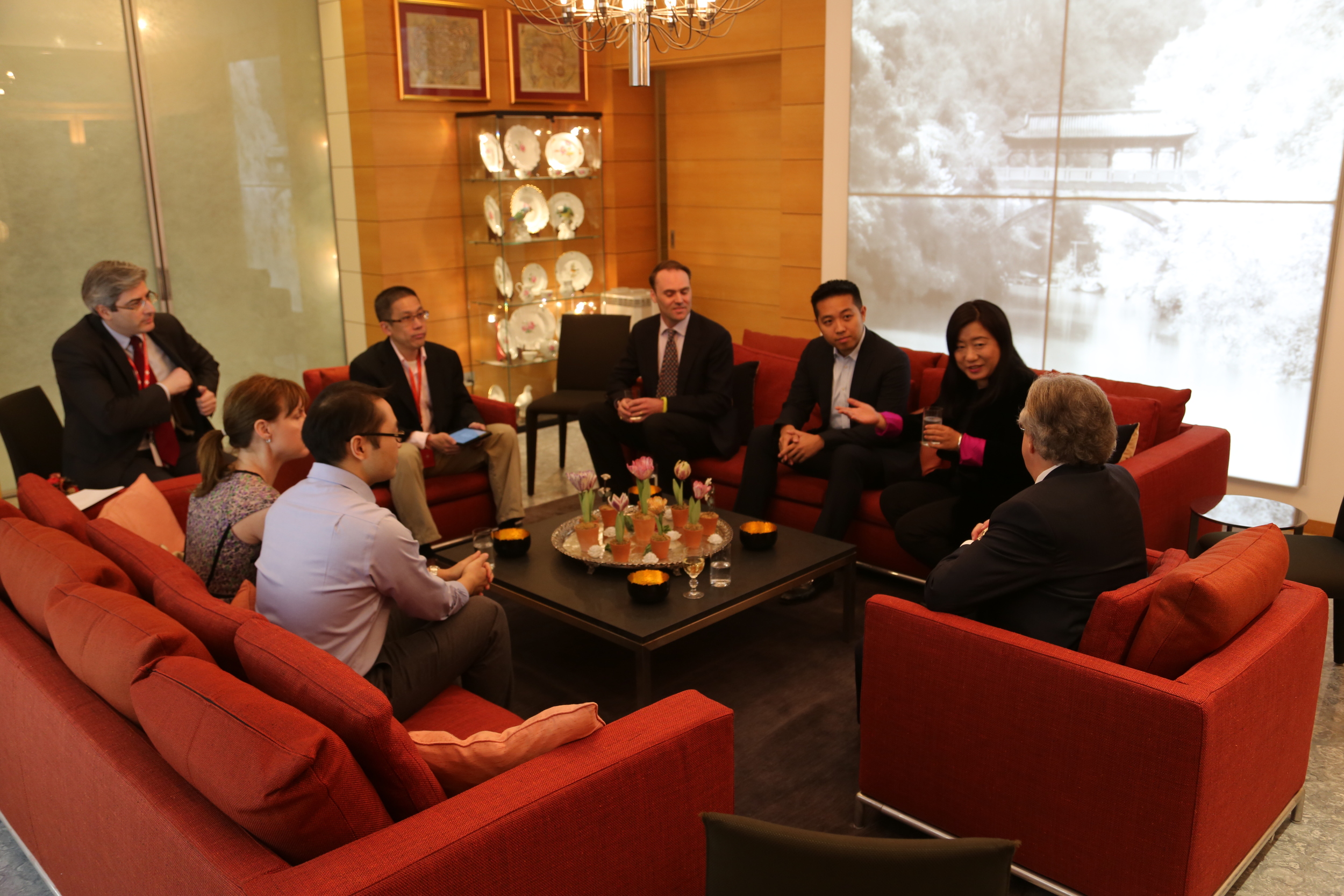
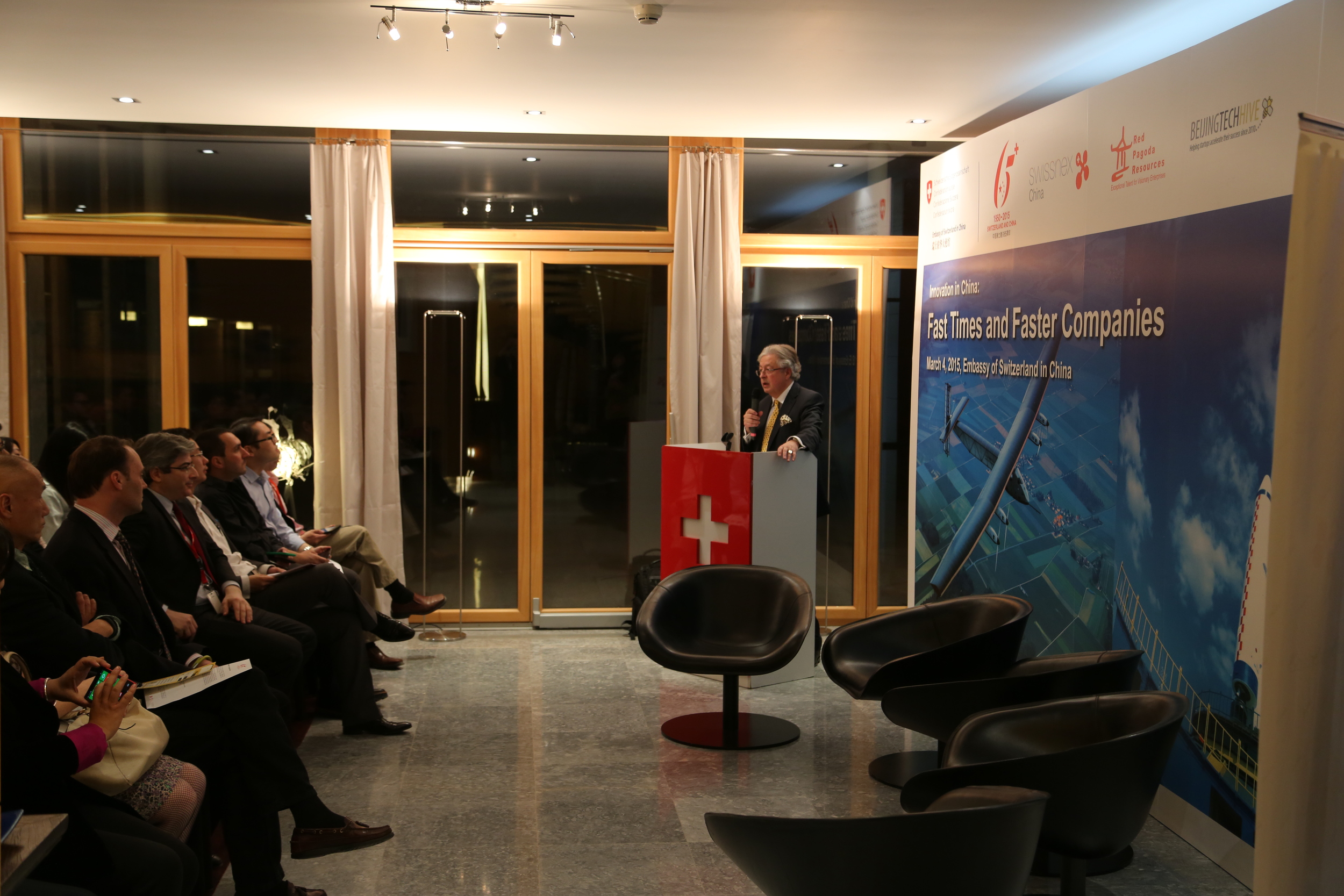
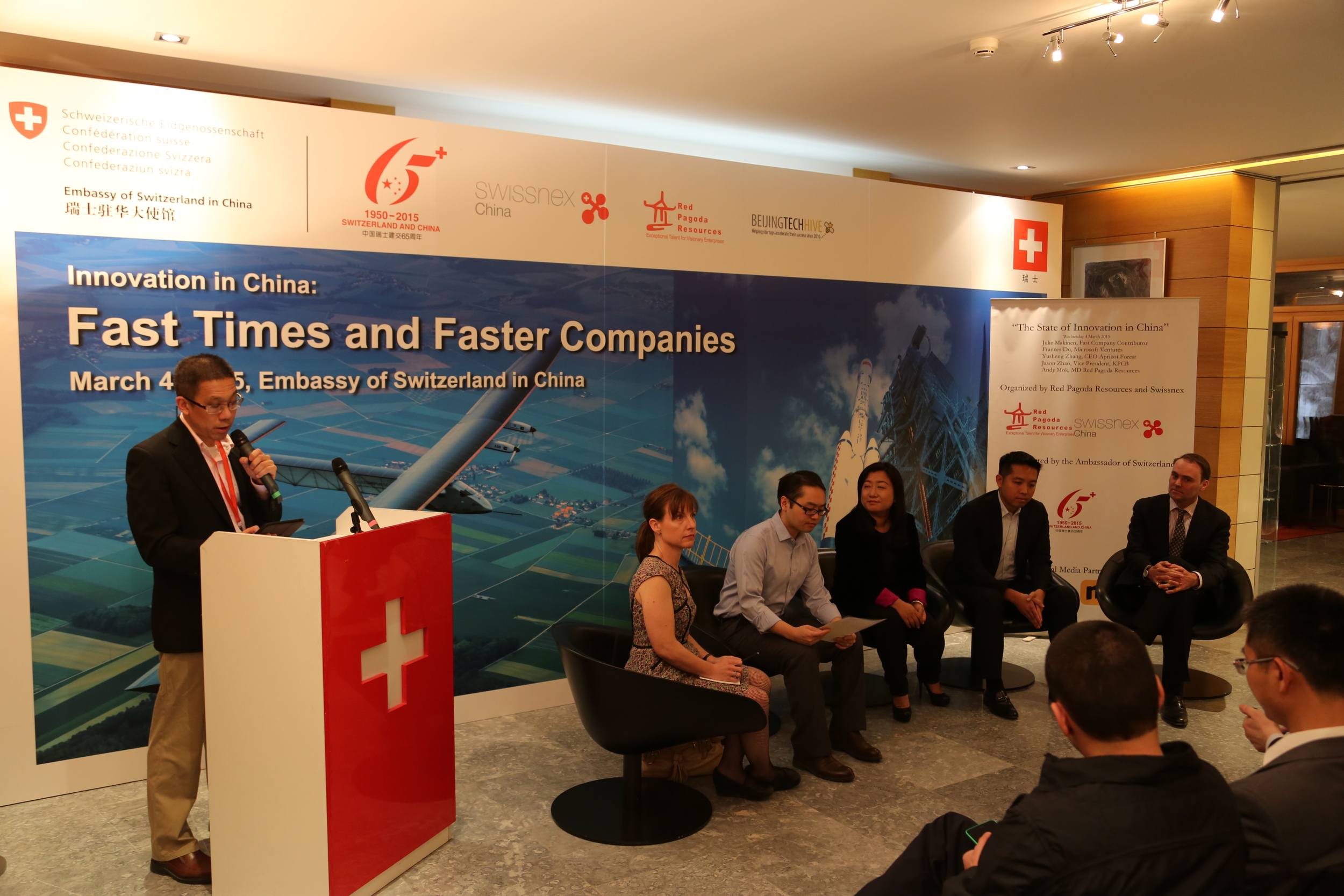
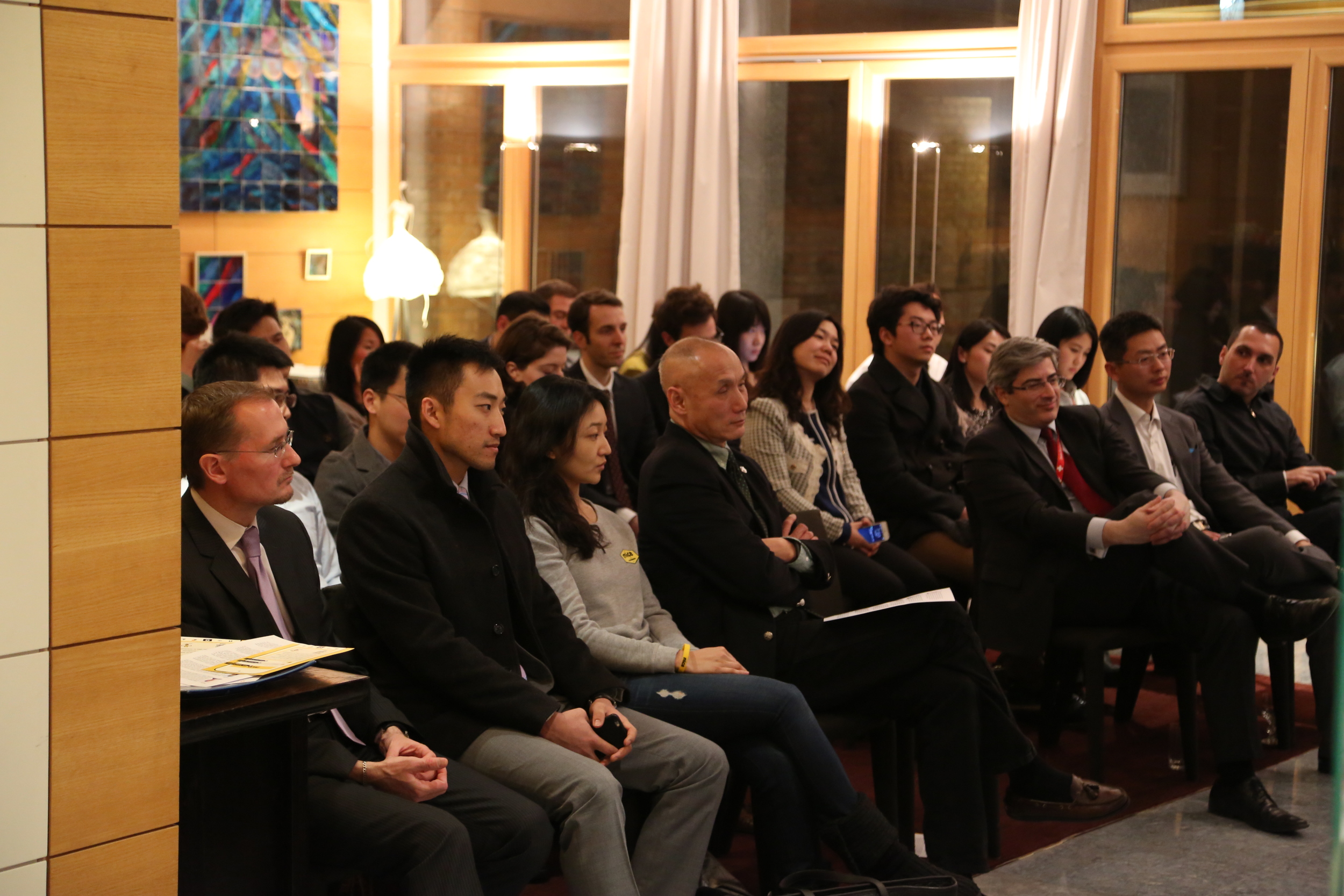


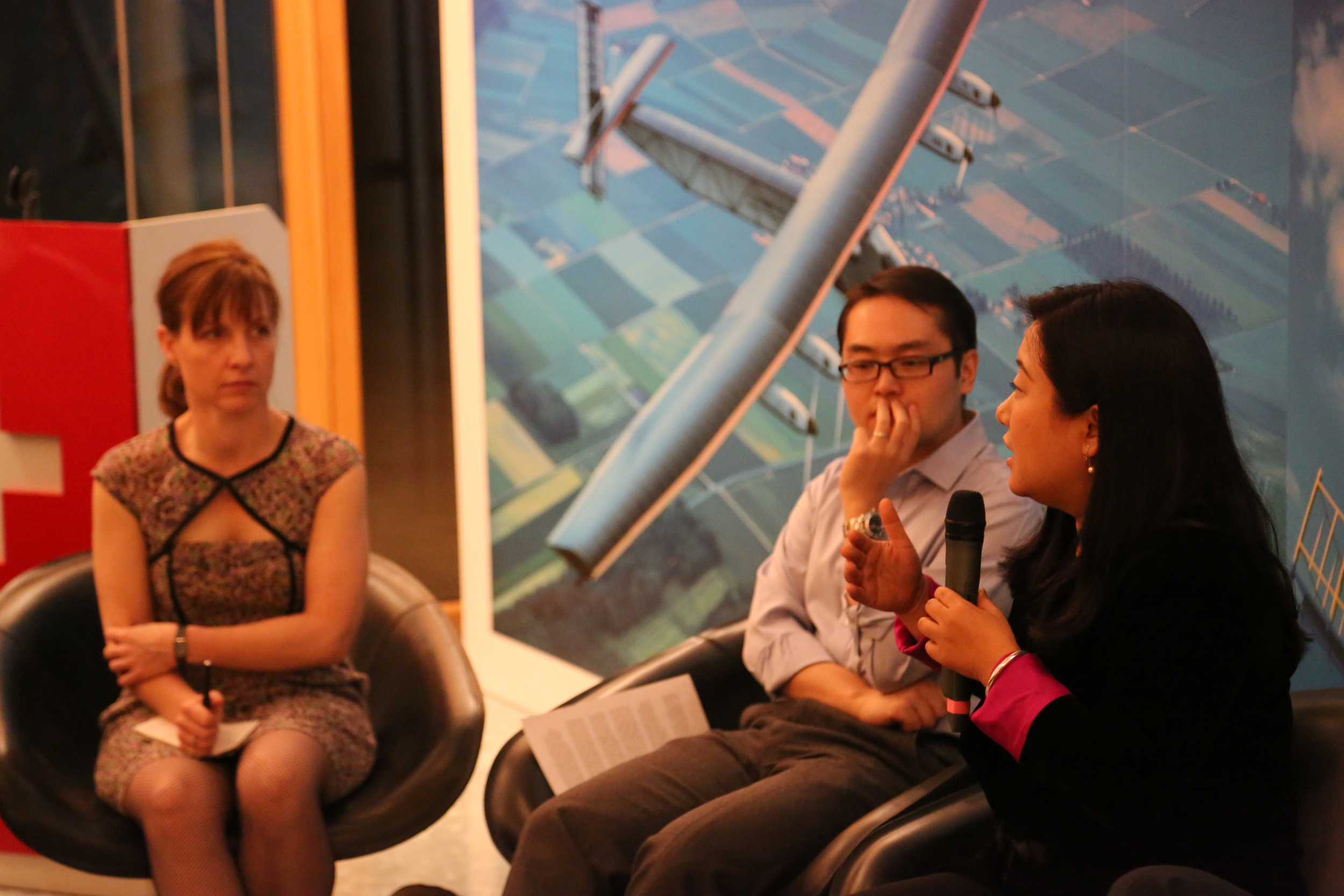
The panel discussion highlighted that innovation is a term, which continuously innovates itself. It strongly relies on social structures, educational institutions, government policies, technologies and their accessibility. A fast moving world requires faster moving companies, able to anticipate and dynamically act to developments in both the near and far future, and to pursue the aim of continuously improving people’s lives or create value within a society. While some critics may argue that China does not innovate particularly well, others like Mrs. Makinen state that China is about to change and to take the lead in innovation. She approaches innovation with an emphasis on technology, accentuating that the access to advanced equipment in, for instance, a hospital, may significantly raise the efficiency of medical doctors dedicating their lives to curing diseases and injuries. Hospitals, unlike humans, act in an institutionalized way, and organizational structures may vary from one place or country to another. It is therefore crucial to engage with new scenarios and domestic institutions in order for a foreign startup or established company to become successful in an unfamiliar market. In a broader sense, the innovative challenge lies not in simply supplying an innovative product to a new market, but rather in a company’s adaptability and willingness to appropriate technologies to a changing context. TradeHero is a perfect example of a foreign startup company based in Singapore, which has gained a strong foothold in China through the customized implementation of innovative technologies, and has achieved to record a remarkable success.
According to Dr. Zhang, innovation starts with caring about an existing problem or discrepancy. In fact, to increase simplicity and make technology cheaper, hence more accessible to the general public, enables changes, creates new opportunities, and facilitates innovative processes. In Du’s opinion, China is currently experiencing exceptional rates of developments in these fields and, as a consequence, is taking big and fast steps in speeding up innovation. Building up on these arguments, Mr. Zhao believes that new technologies now only allow new forms of discoveries, but also strengthen either financial or social networks, again attracting successful foreign companies to major investments in China. As a Swiss representative of visionary entrepreneurs and investors, Mr. Glauser actually made a start-up sports company greatly successful in China. However, he clearly differentiates between technology and innovation, and treats them as two separate entities. In his particular case, Mr. Glauser ingeniously connects the strength of Swiss sports innovation with new Chinese market opportunities. As highly ambitious Swiss projects like the Solar Impulse also show, Switzerland offers Excellency in technology in a relatively small market. China, on the other hand, impresses with a huge market, although its technology standards might still have strong potential for growth. With reference to Mr. Glauser’s success, pairing the two spheres could in fact result in unleashing new and powerful innovative ideas.
In this spirit, the Embassy of Switzerland and swissnex China once again commemorate the 65th Anniversary of the establishment of bilateral relations between Switzerland and China, and promote commitment to research, development, sciences, and technologies all over the world for the benefit of the people and society.
- Contributed by Marcel Schneider, Attaché of Science, Technology and Education Section, Embassy of Switzerland in Beijing

